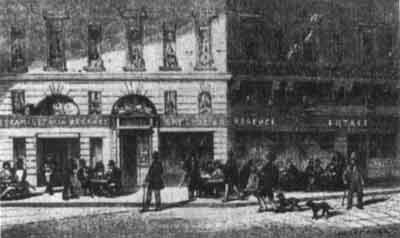|
The 18th century was self-styled as the The Age of
Enlightenment.
Although this movement encompassed Art, Music and Literature, it was more
evident in the philosophers, scientists and social engineers of the time.
For our purposes in discussing chess, the important factors are that the
European intellectual center was now France and that chess, once simply
considered a complex game, was embraced by the intellectuals who brought some of
their powers for abstract thought to bear on chess. Chess was still considered a
game, for sure, and as a game, only deserved a certain amount of one's time and
energy, but, even so, they helped raise chess to a higher level, and essentially
helped keep chess alive. In the previous half century, the popularity of chess
had been waning and little was published and few new ideas had been advanced.
Greco book was the chess bible and people memorized his games without
understanding them. The understanding of chess started to become more
significant as people more capable, and with more leisure time, took up the
game.
 Much
of the philosophic discussions and discourses took place in coffeehouses. In
Paris, the most famous coffeehouse was the Café de la Régence. Much
of the philosophic discussions and discourses took place in coffeehouses. In
Paris, the most famous coffeehouse was the Café de la Régence.
The Café de la Régence attracted the greatest minds and
personages of the era: Diderot, Voltaire, Rousseau, Ben Franklin, Robespierre, a
young Napoleon.
They gathered to discuss ideas and to play chess. The greatest of the chess
players was de Kermur, Sire de Légal who was soon to be supplanted by an even
greater player: Francois-Andre Danican Philidor.
The Café de la Regénce, located on rue Saint-Honoré near the Louvre on la Place
du Palais-Royal, first opened it's doors in 1670. It was owned by an American.
Around 1740, it inherited the chess cliental from the Café Procope and for the
next century and a half, it became the chess Mecca.
In 1840, George Walker described the Café:
"On Sunday all keep their hats on, to save space, and an empty
chair is worth a ransom. The din of voices shakes the roof as we enter, like a
beast-show at feeding time! Can this be chess, the recreation of solitude? We
sigh for cotton to stuff our ears. Mocha is brought. We sip. Manners are to be
noted and chessmen are to be sketched. The English are the best lookers-on in
the world, the French the very worst. They do not hesitate to whisper their
opinions freely, to point with their hands over the board, to foretell the
probable future, to vituperate the past. I have all but vowed that when next I
play chess in Paris, it shall be in a barricaded room."
Around 1760, Diderot remarked: "Paris is the place in the world,
and the Café de la Regence the place in Paris where this game is played best."
There is an impressive list of professional house players who worked La Régence
and players who visited there:
Ignazio Calvi - an Italian player was the house professional there for 4
years. He was able to stash away 40,000 francs.
de Kermur, Sire de Légal
Philidor
Voltaire played a correspondence game, via courier, with Fredrick the
Great at La Régence.
Diderot tells us that the chessboards were rented
by the hour. At night, when a candle had to be fixed on either side, the rent
was higher. "Paris is the place in the world, and the Café de La Régence the
place in Paris where the game is best played."
Ben Franklin - according to "Simpsons Contemporary Quotations", compiled
by James B. Simpson. 1988:
"Dr. Franklin was U.S. Ambassador to France, and the center of
the chess world was located at the Café de la Regence. None other than reputed
world champion Francois Andre Philidor was a regular at the Café, and Franklin
visited the Café in 1781 with the intention of having Philidor autograph his
copy of one of Philidor's books on chess. Of course many visitors to the Cafe
were making the same request to which Café proprietor Jacques Labar had a
prepared denial to keep Philidor from constant interruptions. However upon
recognizing the distinguished Franklin, Labar promptly presented him to
Philidor, who graciously autographed Franklin's book. Once gone, Labar turned to
Philidor saying, 'Francois, you just autographed your book for the American
Ambassador!' Philidor looked up from his game for the first time and said,
'That's funny, I never knew that he was a chess player'."
Deschapples
LaBourdonnais
Jacque-Francois Mouret, known for his drinking as well as his chess, was
both the most renowned operator of the Turk and a house professional at La
Regence.
William Schlumberger, America's best player between 1826-1837,earned 4
francs/day giving lessons there. He taught Saint-Amant the game. (Schlumberger
was also the Turk's last operator)
Pierre Saint-Amant
Lionel Kieseritzky
Daniel Harrwitz, whom Lasker called, "a great player".
Paul Morphy - who played and won his match with Harrwitz there, as well
as his famous 10 hour blindfold demonstration against 8 strong players (winning
6, drawing 2). But contrary to Bird's description of the Cafe de la Régence as
"Morphy's old haunting grounds," Morphy, in a letter to Daniel Fiske in 1863
stated, "I have, for my own part, resolved not to be moved from my purpose of
not engaging in chess hereafter. The few games that I have played here have been
altogether private and sans facon. I never patronize the Cafe de la Régence; it
is a low, and, to borrow a Gallicism, ill frequented establishment."
In 1855 the Café de la Régence moved to a different location, but chess
continued to be played there until 1916 when the chess room was closed down.
|

